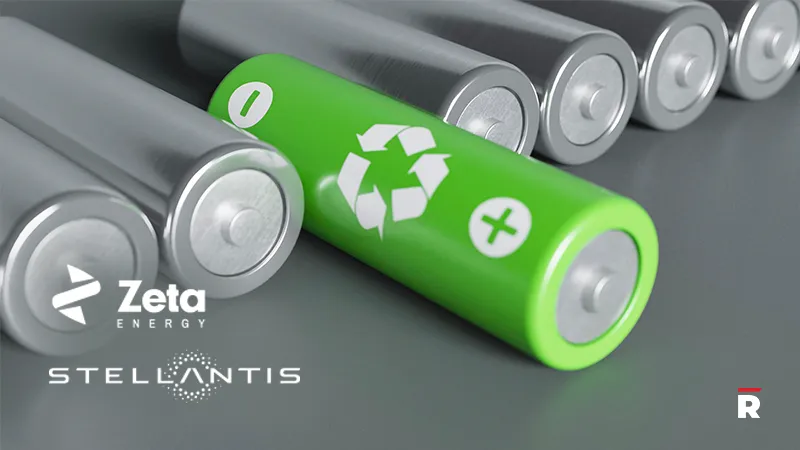Stellantis and Zeta Energy have partnered to supply EV lithium-sulfur batteries to address supply chain resilience, cut costs and boost performance.
Stellantis and Zeta Energy have joined forces in a groundbreaking partnership to develop lithium-sulfur batteries, signalling a significant shift in the electric vehicle (EV) supply chain.
The collaboration aims to transform battery technology by addressing critical supply chain challenges such as cost, performance, sustainability and resilience.
Lowering costs across the supply chain
The lithium-sulfur batteries under development are poised to reshape the economics of EV production. With costs projected to be “less than half the price per kWh of current lithium-ion batteries,” the innovation could significantly lower manufacturing expenses.
The resulting cost reductions are expected to translate into more affordable EVs, driving adoption globally.
The partnership aims to deliver batteries with “game-changing gravimetric energy density while achieving a volumetric energy density comparable to today’s lithium-ion technology.” It translates to lighter batteries with improved range and performance, potentially affecting vehicle design and production.
The advancements will likely simplify logistics processes, reducing the environmental impact of vehicle transportation and assembly.
Stellantis and Zeta Energy’s collaboration takes a bold step toward sustainability by producing batteries using waste materials, including methane and unrefined sulfur. The approach results in “significantly lower CO2 emissions than any existing battery technology,” aligning with Stellantis’ broader goal of achieving carbon neutrality by 2038.
Enhanced supply chain resilience
Zeta Energy’s innovative technology eliminates the need for critical materials such as graphite, cobalt, manganese and nickel. The partnership enhances supply chain resilience by reducing reliance on scarce and geopolitically sensitive resources, mitigating risks associated with material shortages and global market fluctuations.
By design, lithium-sulfur batteries leverage a “short, entirely domestic supply chain in Europe or North America.” The localised approach aims to create more agile and responsive supply chains, reduce transportation-related costs and lower the carbon footprint associated with long-distance logistics.
Ned Curic, Chief Engineering and Technology Officer at Stellantis highlights the significance of this partnership.
He says: “Our collaboration with Zeta Energy is another step in helping advance our electrification strategy as we work to deliver clean, safe and affordable vehicles.”
Tom Pilette, CEO of Zeta Energy, offers similar sentiments: “The combination of Zeta Energy’s lithium-sulfur battery technology with Stellantis’ unrivalled expertise in innovation, global manufacturing and distribution can dramatically improve electric vehicles’ performance and cost profile while increasing the supply chain resiliency for batteries and EVs.”
The partnership aligns with Stellantis’ Dare Forward 2030 strategic plan, which aims to offer more 75 battery EV models. To achieve this ambitious target, Stellantis needs to reconfigure its supply chain to integrate advanced lithium-sulfur technology.
While production of these batteries is targeted for 2030, the automotive supply chain must prepare for this impending shift. It includes adopting new processes, sourcing strategies and manufacturing methods to accommodate the emerging technology.
The Stellantis-Zeta Energy collaboration has the potential to redefine the EV supply chain, making it more sustainable, cost-effective and resilient. By addressing key challenges such as material availability, emissions reduction and production efficiency, the partnership positions Stellantis to lead the charge in the rapidly-evolving electric vehicle sector.
Stellantis charts new leadership
Meanwhile, Stellantis announced Carlos Tavares’s immediate resignation as CEO in recent days, marking a pivotal moment for the global automaker.
The decision, accepted by the Board of Directors under the leadership of Chairman John Elkann, reflects differing perspectives between the Board and former CEO in recent weeks.
Stellantis is establishing an Interim Executive Committee chaired by Elkann to ensure operational continuity. The temporary leadership structure will guide the company while a Special Committee of the Board progresses in its search for a permanent CEO, with an appointment expected by mid-2025.
Henri de Castries, Stellantis’ Senior Independent Director, highlighted the historical alignment between stakeholders and the CEO that has driven the company’s success since its inception, noting that “different views have emerged”.
John expressed gratitude for Carlos’ contributions, stating: “Our thanks go to Carlos for his years of dedicated service and the role he has played in the creation of Stellantis, in addition to the previous turnarounds of PSA and Opel.”
Looking ahead, he reaffirmed the company’s commitment to its strategic objectives, ensuring continuity and focusing on the interests of Stellantis and its stakeholders.
The company now embarks on a new chapter, building on the foundation laid under Carlos’ leadership, including the partnership with Zeta Energy.



